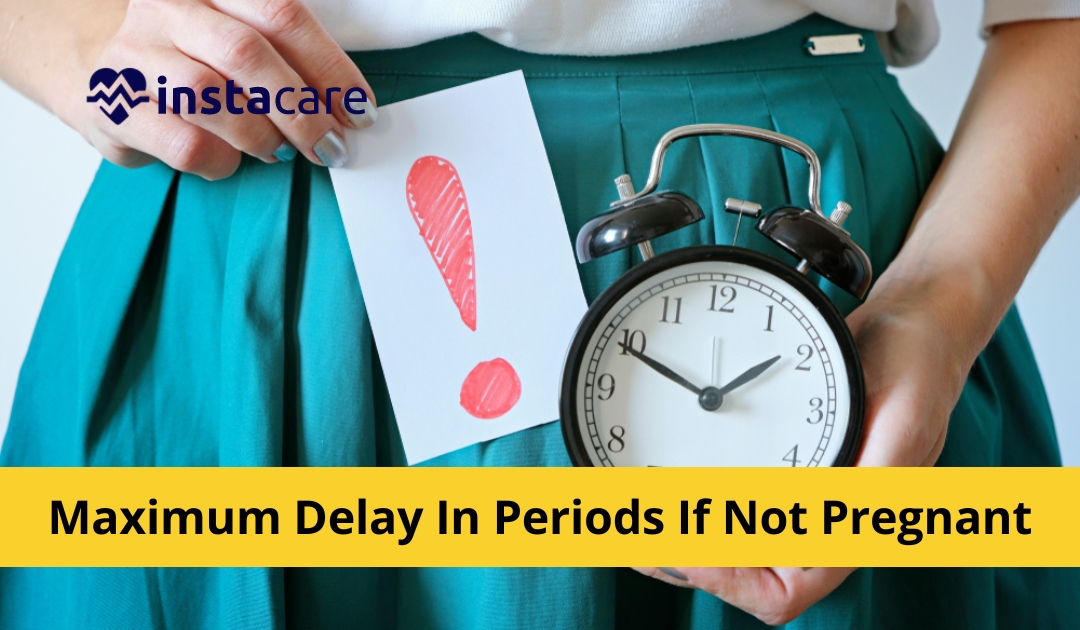Late or missed periods can be extremely stressful, especially if you’re not expecting to be pregnant. Unfortunately, the reality is that many unexpected and unexplained delays in menses may not heavily indicate an impending bundle of joy. In fact, there are numerous causes for late or missed period and it’s important to understand why this might happen so that you can take action. In this blog post, we look at 9 common causes behind maximum delay in periods if you're sadly not pregnant; from thyroid issues to amenorrhea & other medical conditions – so read on!
What can cause delay in periods?
Ladies, we've all been there. You're expecting your period and it doesn't arrive on time. Panic sets in as you try to figure out what could be the cause of this delay. While pregnancy is the most common reason for a missed period, there are various other factors that could cause a delay in periods. Stress, an unhealthy diet, intense exercise regimen, or sudden weight loss or gain are just a few examples.
Other medical conditions that could affect your menstrual cycle include polycystic ovary syndrome, thyroid disorders, or ovarian cysts. It's important to consult with your healthcare provider if you experience a delay in periods, especially if you are experiencing significant pain or discomfort. Remember, every woman's body is different, and it is essential to pay attention to signals that your body is giving out.
8 Reasons Why Your Period Is Late
1- Changes in body weight
Our bodies are constantly in a state of flux, and it's not uncommon to experience changes in body weight. While these fluctuations can be frustrating, they're often a normal part of life and shouldn't necessarily be cause for concern. However, it's important to note that changes in body weight can sometimes lead to changes in menstrual cycles. For example, if you're not pregnant, a significant change in weight can cause a delay in periods.
In fact, studies have shown that there is a maximum delay of 3 to 6 months before seeking medical attention if you haven't had a period. So while changes in weight are a natural part of life, it's important to stay in tune with your body and seek help if needed to ensure your overall health and wellbeing.
2- PCOS may be the cause
Pcos, or polycystic ovary syndrome, is a common hormonal disorder that affects women of reproductive age. It can lead to a range of symptoms, from irregular periods and acne to weight gain and hair loss. One of the most significant effects of pcos is a delay in periods, which can cause anxiety and confusion among women who are not trying to conceive. In fact, according to medical experts, women with pcos may experience a maximum delay in periods of up to three months.
While this delay in periods may be frustrating, it's important to understand that it's a common symptom of pcos and can often be treated with the right care and management. So if you're experiencing a delay in periods and suspect that pcos may be the cause, don't hesitate to speak with your healthcare provider to learn more about your options.
3- Caused by an early menopause
For women, delayed periods can be a cause for concern, especially if there are sudden changes in their menstrual cycle. An early menopause may be one of the reasons why a woman experiences a maximum delay in periods if not pregnant. Menopause is a natural part of a woman's aging process, but when it occurs earlier than expected, it can lead to various health issues.
Women who experience early menopause may have an increased risk for heart disease, osteoporosis, and mood disorders. It's important to seek medical attention if you're experiencing delayed periods because it can be a sign of an underlying health issue. Don't hesitate to talk to your healthcare provider if you have concerns about your menstrual cycle.
View More: Whys And Hows Of Work Out During Pregnancy
4- Having a chronic condition
Having a chronic condition can often impact many aspects of life, including menstrual cycles. If you're not pregnant, a chronic illness can cause a delay in your periods, which can be a cause of concern for many women. Based on various studies, the maximum delay in periods for women who are not pregnant due to a chronic condition can vary greatly.
However, it's important to remember that this delay is not uncommon and can often be managed with proper care and treatment. If you're experiencing a delay in your periods, it's important to discuss any concerns with your healthcare provider to determine the best course of action. Remember, knowledge is power, and staying informed about your overall health and well-being is key to managing a chronic condition.
5- Having a thyroid condition
Living with a thyroid condition can be challenging and life-altering. One of the many symptoms that people with thyroid conditions may experience is a delay in periods. This can be incredibly frustrating and concerning, especially for individuals who are not pregnant. It's important to remember that a delay in periods may be caused by a variety of factors, not just a thyroid condition.
However, if you have been diagnosed with a thyroid condition and are experiencing a delay in your menstrual cycle, it may be worth discussing with your healthcare provider. They may suggest medication or lifestyle changes that could help regulate your menstrual cycle and improve your overall quality of life. Remember, taking care of your health should always be a top priority.
6- Being stressed out
When life gets overwhelming, it's not uncommon to feel stressed out. And while stress can wreak havoc on your emotional and mental well-being, it can also affect your physical health. One of the most common physical symptoms of stress is a delay in periods. This doesn't mean that you're necessarily pregnant, but it's your body's way of responding to the increased levels of stress hormones.
The maximum delay in periods if not pregnant varies from person to person, but it's important to pay attention to any changes in your menstrual cycle and communicate with your healthcare provider. Remember to prioritize self-care and stress-management techniques to keep your body and mind healthy.
7- Increase in workout intensity
If you're looking to take your fitness routine to the next level, then increasing workout intensity might be the answer you've been searching for. However, it's important to remember that this new level of activity can have an impact on your menstrual cycle. If you're not pregnant, then there's typically a maximum delay in periods of seven days.
While a delay in periods can be alarming, it's not uncommon for athletes and those who engage in high-intensity exercise. So, if you're noticing a delay in your menstrual cycle, it might be time to reevaluate your workout routine and give your body the rest it deserves. By being mindful of your body's needs and pushing yourself in a healthy way, you can achieve your fitness goals while still maintaining a balanced menstrual cycle.
8- Using hormonal birth control
One of the many benefits of using hormonal birth control is the ability to delay or even skip your period entirely, especially if you are not pregnant. While every birth control method is unique, most hormonal options work by regulating your menstrual cycle. For example, the pill delivers a steady dose of estrogen and progestin hormones, which can prevent ovulation and therefore prevent periods.
On the other hand, some forms of hormonal birth control, like the depo-provera shot, can cause irregular bleeding or even stop your periods altogether. It's important to consult with your healthcare provider to understand which option is best for you and any potential side effects or risks. But the flexibility and convenience of delaying your period is just one more reason why hormonal birth control can be a great choice for those who are sexually active.
When to visit the doctor
If you're worried about a delay in your period and thinking about making an appointment with your doctor, it's always better to err on the side of caution. While it's normal for a woman's period to fluctuate from month to month, any significant changes could be a warning sign of an underlying condition.
Generally speaking, if you have missed your period for more than three months, it's best to make an appointment with your doctor as soon as possible. More specifically, if you're not pregnant and experiencing a delay of more than two weeks, this could be a sign of a larger issue. So if you're feeling concerned or anxious about any changes in your menstrual cycle, don't hesitate to reach out to your healthcare provider for advice and guidance.
Conclusion
When it comes to making plans for the future and setting goals, it's important to remember that each person's experience is unique. For those who choose not to have children but still plan to experience maximum delay in periods, there are several things they can do. From exercising regularly and eating a balanced diet to avoiding caffeine and managing stress levels effectively, these eight tips can help reduce the length of menstrual cycles while also helping maintain overall health. Ultimately, each individual should make their own decisions based on their health needs - but with a little knowledge and effort, they can achieve the best outcomes for themselves.
Please book an appointment with the best Gynecologist in Lahore, Karachi, Islamabad, and all major cities of Pakistan through InstaCare, or call our helpline at 03171777509 to find the verified doctor for your disease.












